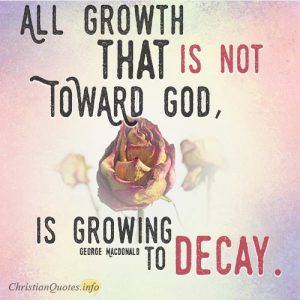– George MacDonald
No Growth, No Life
Jesus once said that “unless a grain of wheat falls into the earth and dies, it remains alone; but if it dies, it bears much fruit” (John 12:24), and unless we are deeply planted within the Word of God, we’ll have no spiritual growth whatsoever. If a plant is not growing, then it must necessarily be dying. Where there is no growth, there is only a withering away. Paul said, “What you sow does not come to life unless it dies” (1 Cor. 15:36), but it grows only after being planted. If we are not abiding in the vine–and that vine is Christ–then that branch is “thrown away like a branch and withers; and the branches are gathered, thrown into the fire, and burned” (John 15:6). If it isn’t abiding in the vine, then it cannot possibly bear any fruit (John 15:4).
Moving Toward or Moving Away
Our flowers follow the sun, and in this way, they are always seeking to grow, as the sun is the source of its growth. In a similar fashion, if we are not following the Son, then we are not finding our true source of growth, which is found only in Him. We are either following the Son or we are stagnant and moving away, and that is the way to decay. Peter admonishes all believers to “grow in the grace and knowledge of our Lord and Savior Jesus Christ” (2 Pet. 3:18) because if we don’t, we’ll lose what we have. Use it or lose it is a practical application here. Gardeners typically remove all the dead and decaying plants so that they don’t negatively affect those around them, and sometimes God will do that to keep the church healthy (1 Cor. 11:30). At the very least, He will prune the plants to induce more growth, and that is often painful but productive. Jesus said as much when he said that “Every branch in me that does not bear fruit he takes away, and every branch that does bear fruit he prunes, that it may bear more fruit” (John 15:2).
At Ease Risks Disease
A plant that’s not growing is more prone to disease, death, and decay, and that’s a risk for the believer, too. This was exactly the case with Israel, who once grew complacent, which is why Amos wrote, “Woe to those who are at ease in Zion, and to those who feel secure on the mountain of Samaria, the notable men of the first of the nations, to whom the house of Israel comes” (Amos 6:10)! Anyone who is coasting has taken their foot off the gas, and the result may eventually be a slowing or coming to a complete stop. The word “woe” is always a word given about the judgment of God, as Jesus said, “Woe to you who are rich, for you have already received your comfort” (Luke 6:24). The rich see no need for God because they have all the comfort they need brought by their money, but their money will perish with them someday.
Conclusion
Mr. MacDonald was correct when he said that all growth that is not toward God is growing to decay because no growth means no life, no source of growth means decline, and no growth means there is a greater risk of disease, decaying, and death. So God tells us all to grow in the knowledge of our Lord because a branch that doesn’t grow is useless and is only good for being thrown into the fire.
 Written by Pastor Jack Wellman
Written by Pastor Jack Wellman


